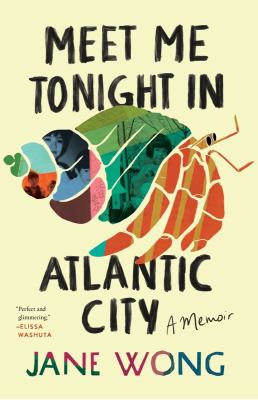Meet Me Tonight in Atlantic City: A Memoir by Jane Wong
Some memoirists paint the past with soft edges, intentionally or perhaps subconsciously smoothing out the rough bits and lingering fondly on the pleasant ones. Not Jane Wong. She lays it all out there, presenting a vivid, heart-wrenching, pull-no-punches exploration of her life (so far). Like the Bruce Springsteen song she chose for her title, Wong’s book has an undercurrent of sadness, and flashes of defiance that signal her strength. It also relates some lighter moments, and conveys her appreciation for her working-class upbringing.
Wong grew up as a “restaurant baby” playing under the tables of her parents’ Chinese restaurant in New Jersey. Her immigrant father, addicted to gambling, abandoned his family for Atlantic City, “like a moth drawn toward light”. Her dear mother didn’t dwell on their misfortune, just worked longer hours sorting mail for the U.S. postal service. After a bumpy adolescence competing for Miss Preteen New Jersey 1997, flirting with shoplifting, experimenting with skin whitening products and green glitter nail polish, and raiding her friend’s parents’ liquor cabinet under the thrall of her alter ego “Wayne”, Wong became the first in her family to attend college. She eventually earned an MFA and a PhD and became a professor, a published and highly lauded poet, and now, a memoirist.
Lest this summary come off as overly sanguine, be assured that from a young age Wong was consumed by rage, which is a running theme for her. At 13, she says, “I felt this feeling churn within me, this rage, this pimple-popping lusciousness of rudeness, this gleaming desire for sudden destruction.” (p. 98) Not merely the throes of hormones, Wong’s anger is fueled by the near-constant stream of indignities and cruelties thrown in her direction, many because of her Chinese heritage. Grade school taunts, noses turned up at her homemade Toisanese lunches, assumptions that she should excel at math and ping pong. Grad school classmates who imply she only got in to meet a racial quota. Worse, her undeniably horrifying experiences with men. The Asian woman fetish is disgustingly real, and on top of that Wong seems to attract a string of “future ex-boyfriends” who demean, assault, threaten, lie to, and cheat on her. Wong struggles with internalized racism, imposter syndrome, and esteem issues.
Wong’s brother Steven and her mother Jin Ai are her biggest supporters, and the mutual love and respect they have for one another is an important balancing force in her life. Her mother sends her boxes laden with Asian pears, reminds her to visit the cemetery for Grave Sweeping Day, proudly FaceTimes from the USPS breakroom, nibbles on mango pits with her and reminds her every day that persistence and tenderness can transcend poverty and abuse.
Wong is first and foremost a poet, and her precise and colorful imagery is evident throughout her memoir. Her narrative is not linear; chapters circle around themes and motifs. While they could be read as independent essays, presented together they create a cohesive portrait of a sensitive, feisty woman “a total nerd, a weirdo, a goofball, someone who wants everyone to love writing as much as I do, someone who knows her worth—despite everyone who doubts me.” (p. 234)
Because Wong teaches creative writing at Western Washington University, Bellingham locales (the Lettered Streets Coffeehouse, Village Books, the Fred Meyer gas station) bubble up occasionally, which add an extra level of familiarity and connection for Whatcom County readers.
Reviewed by Christine Perkins, executive director of Whatcom County Library System.
(Originally published in Cascadia Daily News, June 19, 2023)

